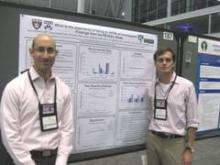BOSTON – Cognitively normal adults who learn that they are at high risk for developing Alzheimer’s disease do not, as some clinicians fear, spiral downward into depression, anxiety, or distress, investigators reported at the Alzheimer’s Association International Conference 2013.
An analysis of data from three randomized trials testing the effects of genetic testing disclosure found that that cognitively normal adults who learned that they were homozygous for the high-risk apolipoprotein E epsilon-4 allele (APOE epsilon-4) had a spike in test-specific distress score until about 6 months after learning the results but returned to levels similar to those of heterozygous carriers, reported Dr. Jason Karlawish, professor of medicine at the University of Pennsylvania, Philadelphia, and his colleagues.
However, both homozygous and heterozygous APOE epsilon-4 carriers had more test-specific distress than did carriers of other APOE alleles, noted coauthor Leo B. Waterston of Harvard Medical School, Boston.
"While there is no question that learning that you’re at higher risk causes some test-specific distress, this further validates that there is no long-term, sustained psychological distress," Dr. Karlawish said in an interview.
People who learned that they were at high risk for developing Alzheimer’s disease (AD) were significantly more like to adopt putative AD risk-reducing behaviors, such as dietary changes, exercise, and medication or vitamin supplementation, he said.
The authors looked at participants in three Risk Evaluation and Education for Alzheimer’s Disease (REVEAL) trial cohorts. The REVEAL study is a series of multicenter trials looking at the effects of APOE genotyping.
They pooled data from three randomized REVEAL trials on a total of 648 patients, identifying 399 (62%) participants who were negative for the epsilon-4 allele, 221 (34%) who were heterozygous carriers of the epsilon-4 allele, and 28 (4%) who were epsilon-4 homozygotes.
They found that epsilon-4 homozygotes and heterozygotes had significantly higher mean test-specific distress levels, compared with noncarriers (P less than .0001), but there were no significant differences between the two epsilon-4–positive groups.
Asked at 1-year follow-up how they perceived their risk for AD, 64% of heterozygous carriers and 72% of homozygous carriers rated their risk as high or very high, a difference that was not significant. In contrast, about half of all noncarriers rated their risk as average and about 15% rated it as high, but none rated their risk as very high.
There were no significant differences in mean depression scores on the Center for Epidemiologic Studies Depression Scale.
Nearly two-thirds (61%) of homozygous carriers reported dietary changes at 12 months, compared with 34% of heterozygous carriers and 27% of noncarriers. Homozygotes also were more likely to report increases in exercise (58% vs. 39% and 28%, respectively), and to take medication and/or vitamins to try to stave off AD (58% vs. 38% and 27%, P less than .001 for all comparisons).
Dr. Karlawish noted that, although there were only 28 participants who carried both copies of the epsilon-4 allele, analysis of individual participants suggested that the data across this group were uniform and not skewed by outliers. He also noted that the distribution of APOE alleles in the study mirrored that of the population at large.
Mr. Waterston said that they are currently mailing follow-up surveys to participants and hope to continue with long-term follow-up.
The research was supported by grants from the National Institutes of Health. Dr. Karlawish and Mr. Waterston reported having no financial disclosures.


